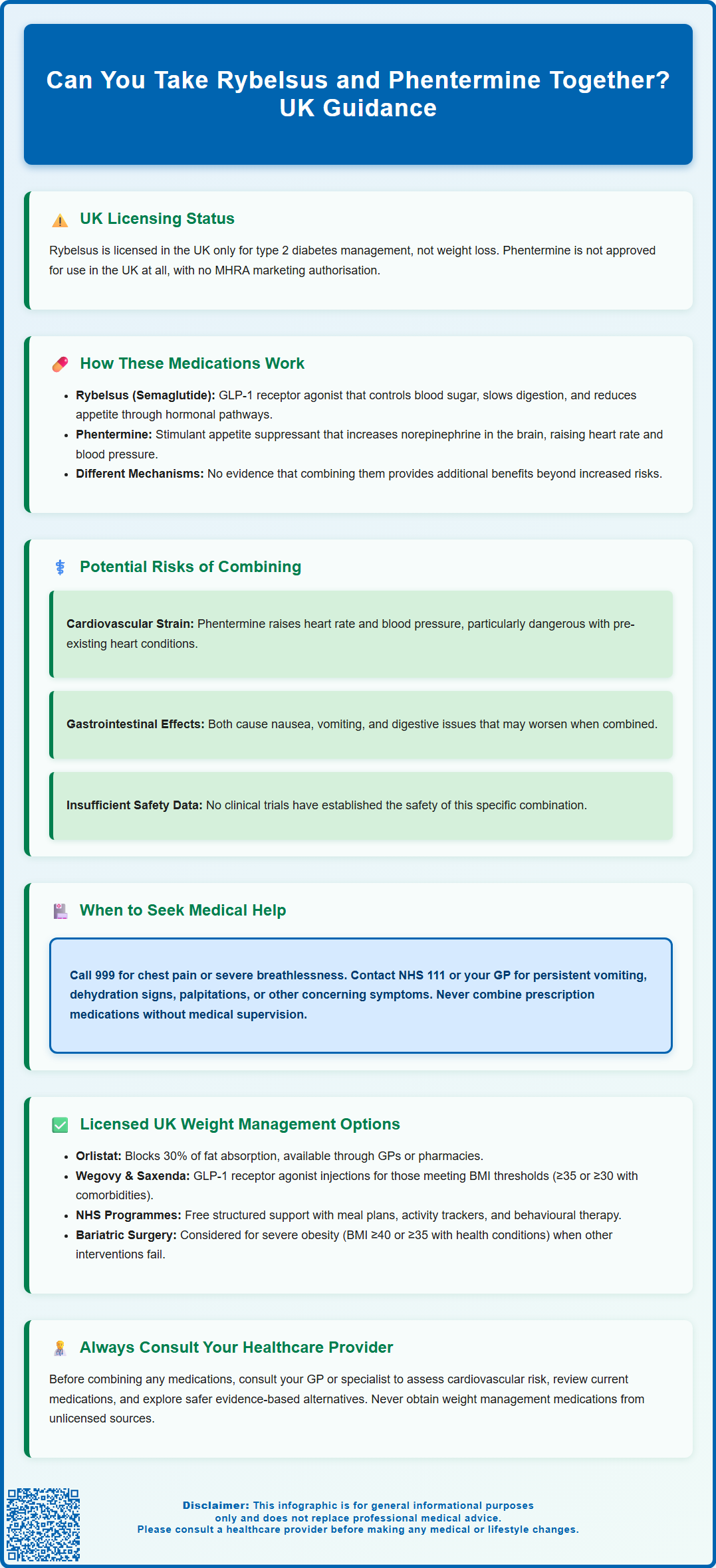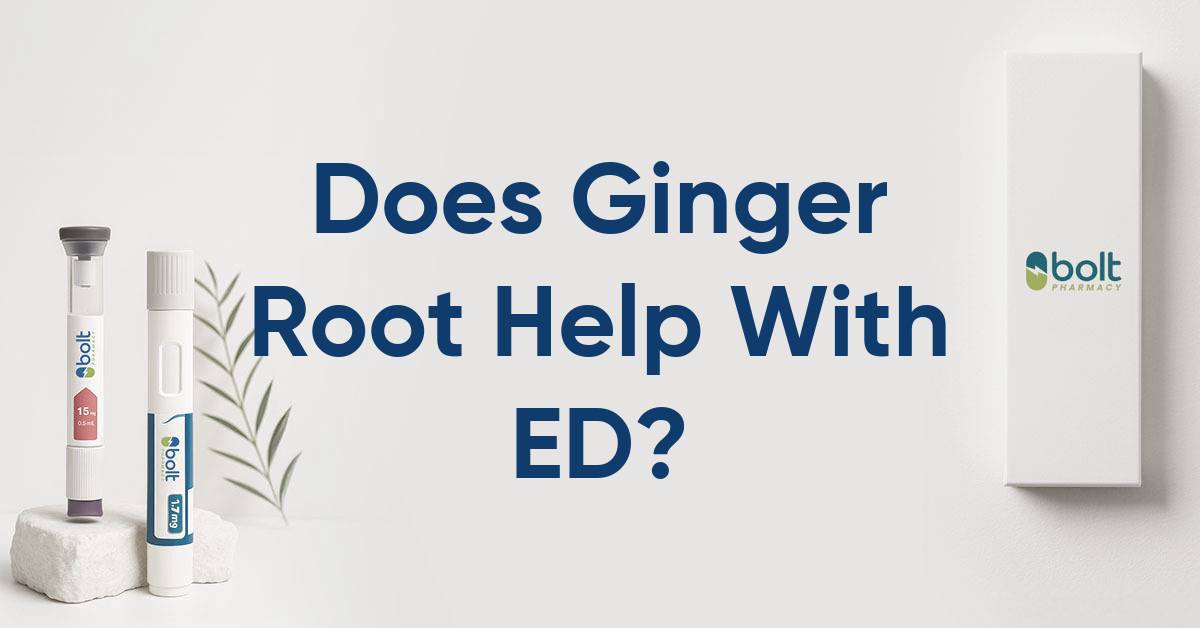Can you take Rybelsus and phentermine together? This combination is not routinely recommended in the UK, and there is limited clinical evidence supporting their concurrent use. Rybelsus (semaglutide) is licensed by the MHRA for type 2 diabetes management, not weight loss, whilst phentermine lacks UK marketing authorisation and is not recommended by NICE. Combining these medications may increase risks of cardiovascular complications and gastrointestinal disturbances. No official guidance from NICE or the MHRA addresses this specific combination. If you are considering using both medications, consult your GP or specialist to assess your individual risk profile and explore safer, evidence-based alternatives within the UK healthcare system.
Summary: Combining Rybelsus and phentermine is not routinely recommended in the UK due to limited clinical evidence, increased risk of cardiovascular and gastrointestinal adverse effects, and phentermine's lack of UK marketing authorisation.
- Rybelsus (semaglutide) is a GLP-1 receptor agonist licensed by the MHRA for type 2 diabetes management, not weight loss.
- Phentermine is a sympathomimetic appetite suppressant without UK marketing authorisation and is not recommended by NICE.
- Combining these medications may increase cardiovascular risks (elevated heart rate, blood pressure) and gastrointestinal side effects (nausea, vomiting, constipation).
- No official NICE or MHRA guidance exists for this combination, and there is insufficient clinical trial data on safety.
- UK-licensed weight management options include orlistat, Wegovy (semaglutide injection), and Saxenda (liraglutide injection) for appropriate patients.
- Healthcare professionals advise against obtaining medications from unlicensed sources or combining treatments without medical supervision.
Table of Contents
Can You Take Rybelsus and Phentermine Together?
The combination of Rybelsus (semaglutide) and phentermine is not routinely recommended in the UK, and there is limited clinical evidence supporting their concurrent use. Rybelsus is licensed by the MHRA for type 2 diabetes management (glycaemic control), not for weight management. Phentermine does not have a UK marketing authorisation and is not recommended by NICE.
Patients who have obtained phentermine through private prescriptions or international sources should be aware that combining it with Rybelsus may increase the risk of adverse effects, particularly cardiovascular complications and gastrointestinal disturbances. There is no official guidance from NICE or the MHRA regarding this specific combination, as phentermine is not approved for use in the UK.
If you are considering using both medications together, it is essential to discuss this with your GP or specialist before proceeding. Your healthcare provider will need to assess your individual cardiovascular risk profile, current medications, and weight management goals. They can provide guidance on evidence-based alternatives that are both licensed and monitored within the UK healthcare system.
Key considerations include:
-
Phentermine's lack of UK marketing authorisation
-
Potential drug interactions and cumulative side effects
-
Cardiovascular risk assessment
-
Availability of safer, evidence-based alternatives
Never combine prescription medications without explicit medical supervision, as this may compromise your safety and treatment outcomes.

How Rybelsus and Phentermine Work for Weight Loss
Rybelsus (semaglutide) is a glucagon-like peptide-1 (GLP-1) receptor agonist that works by mimicking the action of the naturally occurring hormone GLP-1. It enhances insulin secretion in response to meals, suppresses glucagon release, and slows gastric emptying. These mechanisms help regulate blood glucose levels in people with type 2 diabetes. Additionally, semaglutide acts on appetite centres in the brain, reducing hunger and promoting satiety, which can lead to weight loss as a secondary benefit. Rybelsus must be taken orally once daily on an empty stomach with no more than 120 ml of water, and patients should wait at least 30 minutes before eating, drinking or taking other oral medicines.
The weight loss observed with Rybelsus typically occurs gradually over several months, with clinical trials (PIONEER programme) demonstrating average reductions of 3-5% of body weight when used for diabetes management. Higher doses of semaglutide (available as Wegovy injection) are specifically licensed for weight management and produce more substantial weight loss.
Phentermine, by contrast, is a sympathomimetic amine that acts as an appetite suppressant through stimulation of the central nervous system. It increases the release of norepinephrine in the hypothalamus, which reduces appetite signals. Phentermine works relatively quickly, often producing appetite suppression within hours of administration. However, its stimulant properties can increase heart rate and blood pressure.
Whilst both medications can reduce appetite, they achieve this through entirely different mechanisms. Rybelsus works through hormonal pathways that regulate metabolism and satiety, whilst phentermine directly stimulates the nervous system. This fundamental difference in pharmacology means that there is no evidence that combining them provides additional benefits, and there is potential for additive adverse effects, particularly cardiovascular strain and gastrointestinal side effects.
Potential Risks of Combining Rybelsus and Phentermine
Combining Rybelsus and phentermine may significantly increase the risk of adverse effects, particularly affecting the cardiovascular and gastrointestinal systems. Cardiovascular concerns are paramount, as phentermine can elevate heart rate and blood pressure through its sympathomimetic activity. Patients with pre-existing hypertension, coronary artery disease, or arrhythmias face heightened risks. GLP-1 receptor agonists have demonstrated cardiovascular benefits with some injectable agents; oral semaglutide demonstrated cardiovascular safety (non-inferiority) in the PIONEER 6 trial, but the addition of a stimulant medication may compromise this profile.
Gastrointestinal side effects are common with Rybelsus, including nausea, vomiting, diarrhoea, and constipation, particularly during dose escalation. These effects result from slowed gastric emptying and direct effects on the gastrointestinal tract. Phentermine can also cause gastrointestinal disturbances, including dry mouth, constipation, and abdominal discomfort. When used together, these medications may produce cumulative gastrointestinal symptoms that significantly impact quality of life and medication adherence.
Other potential risks include:
-
Increased heart rate and palpitations from phentermine's stimulant effects
-
Insomnia and anxiety, as phentermine affects the central nervous system
-
Hypoglycaemia risk if Rybelsus is combined with insulin or sulfonylureas
-
Dehydration from reduced fluid intake due to appetite suppression and gastrointestinal losses
There is insufficient clinical trial data examining the safety profile of this specific combination. Most weight-loss medication studies evaluate single agents or approved combinations. The absence of evidence does not confirm safety, and patients should be aware that using unlicensed combinations places them outside established safety monitoring frameworks.
If you experience chest pain or severe breathlessness, call 999 immediately. For persistent vomiting, signs of dehydration, or other concerning symptoms whilst taking either medication, contact NHS 111 for urgent advice or see your GP. Report any suspected side effects to the MHRA Yellow Card scheme (yellowcard.mhra.gov.uk).
What Healthcare Professionals Recommend
Healthcare professionals in the UK follow NICE guidance when prescribing weight management medications, which currently does not include phentermine due to its lack of UK marketing authorisation. Rybelsus is indicated for glycaemic control in type 2 diabetes, either as monotherapy when metformin is contraindicated or not tolerated, or as add-on therapy. It is not licensed for weight management, regardless of BMI.
For weight management specifically, NICE recommends a stepwise approach beginning with lifestyle interventions, including dietary modification and increased physical activity. Pharmacological interventions are considered only when lifestyle measures have been insufficient and specific BMI thresholds are met.
Currently licensed weight management medications in the UK include:
-
Orlistat (lipase inhibitor that reduces fat absorption)
-
Wegovy (semaglutide injection) for chronic weight management (typically BMI ≥35 kg/m², or ≥30 kg/m² with weight-related comorbidities, via specialist weight management services)
-
Saxenda (liraglutide injection), another GLP-1 receptor agonist (typically BMI ≥35 kg/m², or ≥30 kg/m² with weight-related comorbidities)
-
Mysimba (naltrexone/bupropion) is licensed but not routinely commissioned by the NHS
NICE recommends lower BMI thresholds (typically 2.5 kg/m² lower) for people from South Asian, Chinese, other Asian, Middle Eastern, Black African, or African-Caribbean backgrounds.
Your GP or specialist will conduct a thorough assessment before prescribing any weight management medication, including:
-
Calculation of BMI and waist circumference
-
Cardiovascular risk assessment
-
Review of comorbidities (diabetes, hypertension, dyslipidaemia)
-
Evaluation of previous weight loss attempts
-
Discussion of realistic goals and expectations
Healthcare professionals strongly advise against obtaining medications from unlicensed sources or combining treatments without medical supervision. If you are currently taking phentermine obtained privately or from abroad, inform your doctor immediately, as this will influence their prescribing decisions and monitoring requirements. Regular follow-up appointments are essential to monitor treatment response, side effects, and overall health status when using any weight management medication.
Alternative Weight Management Options in the UK
The UK offers numerous evidence-based weight management options that are safer and better supported than unlicensed medication combinations. NHS-funded programmes provide structured support for weight loss, including the NHS Better Health Weight Loss Plan, which offers free resources, meal plans, and activity trackers. Many local authorities commission tier 2 weight management services that provide group-based or individual support from trained practitioners.
For individuals meeting specific criteria, pharmacological options licensed in the UK include orlistat, which can be prescribed by GPs (120 mg) or purchased from pharmacies (alli, 60 mg) following consultation. Orlistat works by blocking approximately 30% of dietary fat absorption (120 mg dose) and is most effective when combined with a reduced-calorie, lower-fat diet. For those with higher BMI thresholds, GLP-1 receptor agonists such as Wegovy or Saxenda may be appropriate, though availability through the NHS can be limited due to supply constraints and commissioning decisions.
Behavioural and psychological support forms the cornerstone of sustainable weight management. Cognitive behavioural therapy (CBT) approaches help address emotional eating, develop healthier relationships with food, and build long-term behaviour change skills. Some areas offer specialist weight management services through multidisciplinary teams including dietitians, psychologists, and exercise specialists.
For individuals with severe obesity (BMI ≥40 kg/m², or ≥35 kg/m² with comorbidities), bariatric surgery may be considered following comprehensive assessment. NICE recommends surgical options such as gastric bypass or sleeve gastrectomy when other interventions have been unsuccessful. Earlier consideration for bariatric surgery may be appropriate for people with type 2 diabetes, and lower BMI thresholds apply for people from certain ethnic backgrounds.
Key principles for successful weight management include:
-
Sustainable dietary changes rather than restrictive diets
-
Regular physical activity (aim for 150 minutes of moderate activity weekly)
-
Adequate sleep and stress management
-
Regular monitoring and professional support
-
Realistic goal-setting (5-10% weight loss produces significant health benefits)
Discuss your weight management goals with your GP, who can refer you to appropriate local services and ensure any medical interventions are safe, evidence-based, and properly monitored. Sustainable weight loss typically occurs at 0.5-1 kg per week, and patience with the process improves long-term success rates.
Frequently Asked Questions
Is phentermine approved for use in the UK?
No, phentermine does not have UK marketing authorisation and is not recommended by NICE. It is not available through NHS prescriptions and should not be obtained from unlicensed sources.
What are the risks of combining Rybelsus and phentermine?
Combining these medications may increase cardiovascular risks such as elevated heart rate and blood pressure, as well as cumulative gastrointestinal side effects including nausea, vomiting, and constipation. There is insufficient clinical trial data on the safety of this combination.
What weight management medications are licensed in the UK?
UK-licensed weight management medications include orlistat (available on prescription or over the counter), Wegovy (semaglutide injection), Saxenda (liraglutide injection), and Mysimba (naltrexone/bupropion), though availability and commissioning vary. Your GP can advise on appropriate options based on your individual circumstances.
The health-related content published on this site is based on credible scientific sources and is periodically reviewed to ensure accuracy and relevance. Although we aim to reflect the most current medical knowledge, the material is meant for general education and awareness only.
The information on this site is not a substitute for professional medical advice. For any health concerns, please speak with a qualified medical professional. By using this information, you acknowledge responsibility for any decisions made and understand we are not liable for any consequences that may result.
Heading 1
Heading 2
Heading 3
Heading 4
Heading 5
Heading 6
Lorem ipsum dolor sit amet, consectetur adipiscing elit, sed do eiusmod tempor incididunt ut labore et dolore magna aliqua. Ut enim ad minim veniam, quis nostrud exercitation ullamco laboris nisi ut aliquip ex ea commodo consequat. Duis aute irure dolor in reprehenderit in voluptate velit esse cillum dolore eu fugiat nulla pariatur.
Block quote
Ordered list
- Item 1
- Item 2
- Item 3
Unordered list
- Item A
- Item B
- Item C
Bold text
Emphasis
Superscript
Subscript












